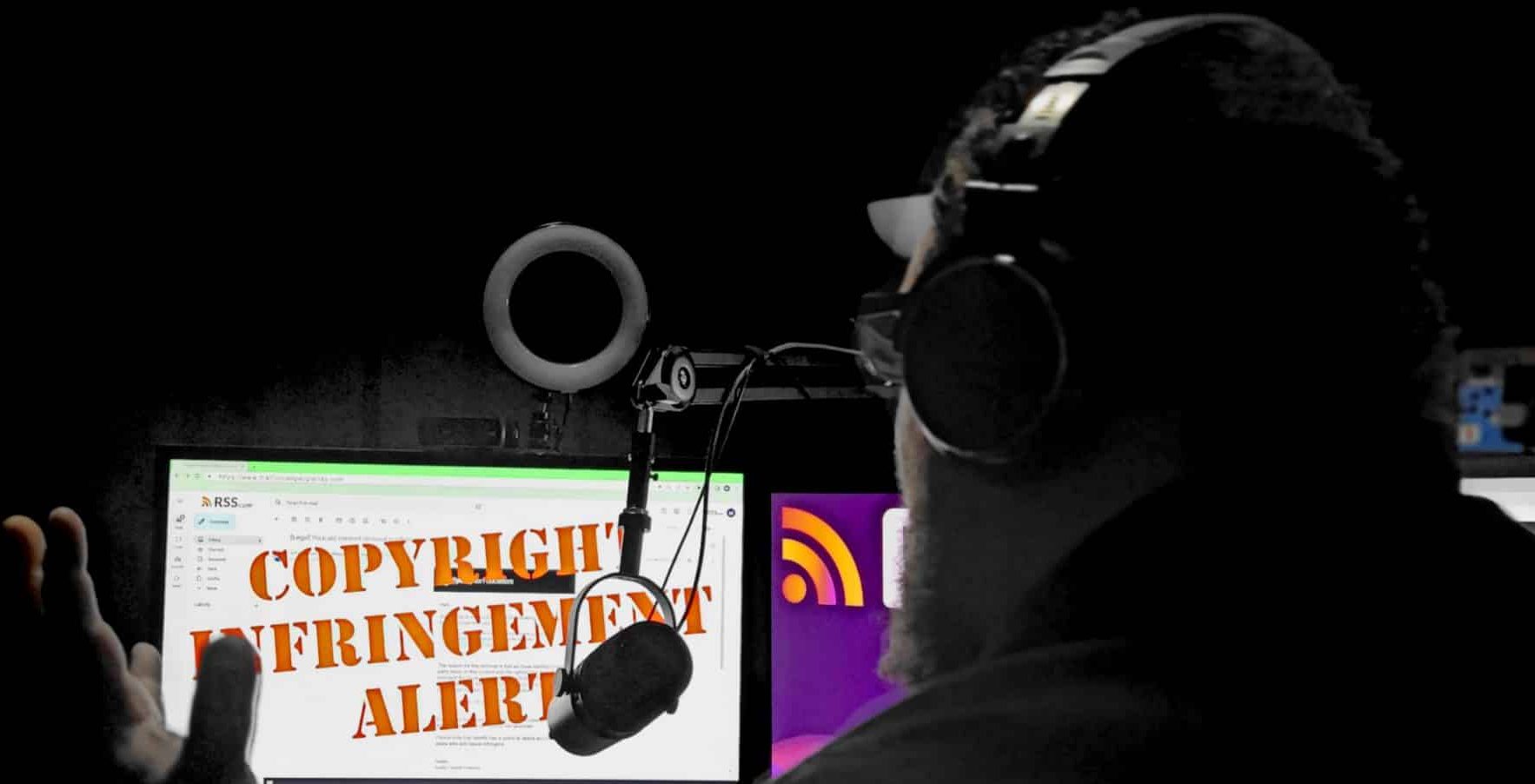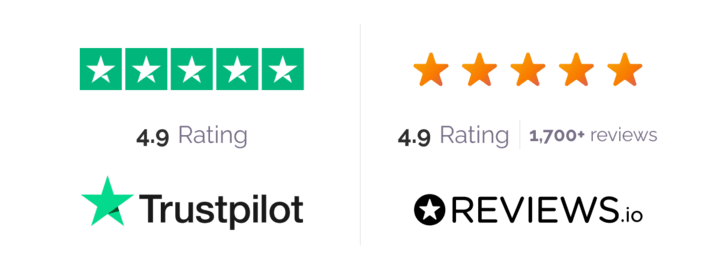Podcasting is more than talking, It’s a performance: An audio tapestry weaving stories and conversations for its listeners.
Accenting those conversations is often music and sound design. Sound engineers will sprinkle in dissonant tones to convey suspense, or play a jaunty tune to transition into another segment.
A podcast’s sound design can be simple and with purpose, or complex and emotionally engrossing. The internet is full of audio resources for podcasters, but it’s important to make sure you have the proper permissions to use that audio on your show.
Imagine spending hours or even days, working to put out your best episode yet … only to have it taken down due to its inclusion of a piece of music you didn’t get permission to use. Nobody should have to go through that!
To help you avoid the heartache of an episode or podcast takedown, we’ve provided some information below about the different types of copyrights, infringement claims, myths of loopholes, and even some ways to score free music for your show!
I received a DMCA notice/infringement claim. Now what?
First of all, breathe.
It’s highly unlikely any major legal action or fines will be coming your way.
The worst case scenario is likely the content getting taken down, or you might have to reupload the content without the copyrighted material.
But how did they even know you were using copyrighted materials?
Many podcast and digital media platforms have AI that can detect copyrighted content in media posted within their own platforms. AI will scan music and podcasts, and detect even seconds of copyrighted audio in the posted content.
This could be music sampled by a DJ without permission, or that clip of a Beyoncé song you used on your podcast episode about modern day queens. These tracking tools are especially important for platforms like Spotify and YouTube that also have relationships with music artists and labels.
No company is going to risk an important existing relationship with a record label by allowing other users to post their unlicensed copyrighted material. Your podcast could also be flagged due to a listener reporting you.
Each platform has its own rules and guidelines. YouTube, for example, will most of the time respond by not allowing you monetize the offending content. Instead, YouTube will monetize your content for the copyright holder. The copyright holder may also choose to simply have your content taken down. Or they may have the offending audio removed from your content leaving an awkwardly silent section of video.
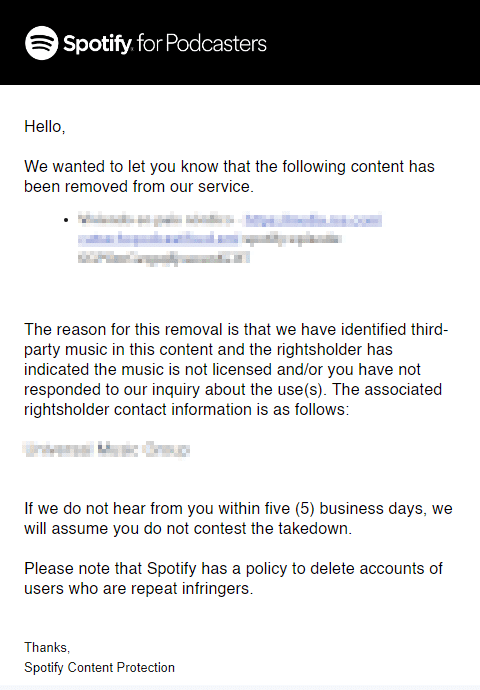
Spotify often chooses to remove your flagged episode or entire show from their platform. RSS.com and other hosting platforms have no control over how other companies choose to enforce their policies on your syndicated content.
As a rule, podcast hosting platforms follow DMCA (Digital Millennium Copyright Act) guidelines and will take down any content that has been reported by the copyright holder. If your entire podcast is flagged and/or removed on other platforms for a DMCA violation, Your podcast hosting site may deem it necessary to suspend your podcast. You may be allowed to reupload the content in question with the copyrighted content removed, or if you believe the claim to be an error, you can contest the infringement claim.
What is copyrighted music?
A copyright according to Copyright.gov, is “a type of intellectual property that protects original works of authorship as soon as an author fixes the work in a tangible form of expression.“
In short, a copyright is legal ownership that is automatically attached to any creative work that you have captured permanently. It can be a recorded piece of music, or a painting, or a podcast episode. It doesn’t matter how long you’ve possessed a copy of someone else’s copyrighted music, or in what form you own it.
That old record of the spooky sounds of Halloween? Someone owns that copyright. A digital download of that unsigned band you saw last week in a coffee shop? They have the copyright for their music. The little melody that plays when you open up a musical anniversary card? Copyrighted. You don’t have the right to use that music, even if you include it within other content or change the medium.
Putting a song on your podcast is a form of reproducing that song. Someone has the sole right to reproduce that piece of music, and can give you permission to reproduce it, but you can’t include that music in any publicly available content without getting permission. I know it can be frustrating, but copyrights are there to protect the creative people that have willed this art and media into existence.
What kind of copyrights are there for music?
Music traditionally has two different kinds of copyrights: A copyright on the song (mechanical rights), and a copyright on a specific performance of the song (performance rights).
These copyrights can be held by different entities. A record label might have the copyright of the album version of the song (performance right), but if the performer has the copyright to the song itself (mechanical rights), they could record or perform another version of the song anytime they please.
Am I able to use copyrighted music inside my podcast?
The short answer is: Not without express permission of the copyright holder(s). This is also true for audio from video clips. There are a lot of myths about copyrighted music for podcasts:
- You can’t use a certain number of seconds of a song without permission.
- You can’t have a friend record a version of another performer’s song and use it.
- It doesn’t matter if your podcast makes money or not.
- You don’t have permission to use a song in your podcast because you bought a physical or digital copy of the song.
- “Fair Use” has extremely specific guidelines. Claiming fair use doesn’t prevent you from being sued for copyright infringement.
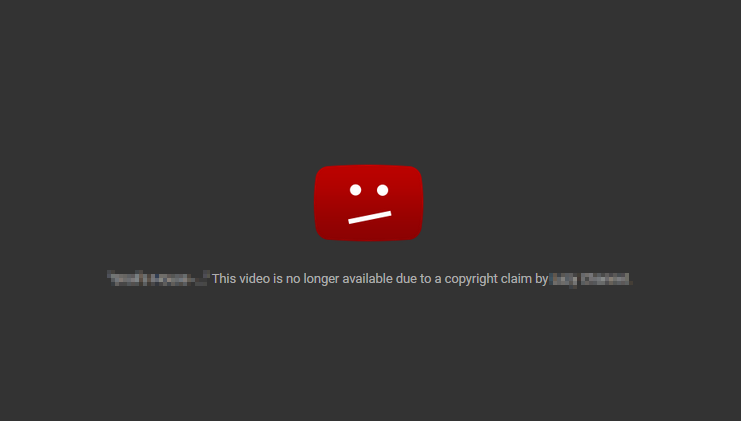
How to get permission to use copyrighted music for your podcast
If you want to play a song (or part of a song) on your podcast, first you would need to find out who holds the mechanical rights and performance rights for the version of the song you’d like to play. Then you would need to agree to terms. They might ask for “per episode” royalties, or more likely “per use” royalties.
The difference between mechanical rights and performance rights
Music traditionally has two different copyrights: A copyright on the song (mechanical rights), and a copyright on a specific performance of the song (performance rights). These copyrights can be held by different entities. A record label might have the copyright of the album version of the song (performance right), but if the performer has the copyright to the song itself (mechanical rights), they could record or perform another version of the song anytime they please.
Paying Royalties
Royalties are the payments made to the copyright holder(s) for the use, performance, and/or alteration of their copyrighted works. These royalties can be paid each time a copyrighted song is used in an episode of your podcast (per episode), or a flat payment for a specific way you use the song like your introduction (per use).
Fair Use and Incidental Inclusion
“Fair Use” permits a party to use copyrighted works for a variety of purposes, including criticism, comment, news reporting, teaching, scholarship, or research depending on the outcome of a four-factor test set forth in the
Copyright Act:
- The purpose and character of the use, including whether such use is of a commercial nature or is for nonprofit educational purposes.
- The nature of the copyrighted work.
- The amount and substantiality of the portion used in relation to the copyrighted work as a whole.
- The effect of the use upon the potential market for or value of the copyrighted work.
Proving “Fair Use” in court can be tricky and expensive, so review the Fair Use Index and check with legal counsel to be sure your content qualifies as “fair use” before including it in your podcast.
“Incidental Inclusion” means copyrighted material that is unintentionally included in your content. Usually meaning it’s background noise. This covers incidents like a car driving by blasting a song when you’re recording, or maybe music playing in the background at an event or festival. This won’t cover music being played at a low volume in your studio. It’s got to be clearly unintentional.
Support local artists! Support your friends!
An easier method for securing permission to use music in your podcast is to find an independent artist or band/group that self-releases their music. They would likely have complete ownership of both copyrights and could make an agreement that grants you full permission to use their song. Just make sure you get it in writing!
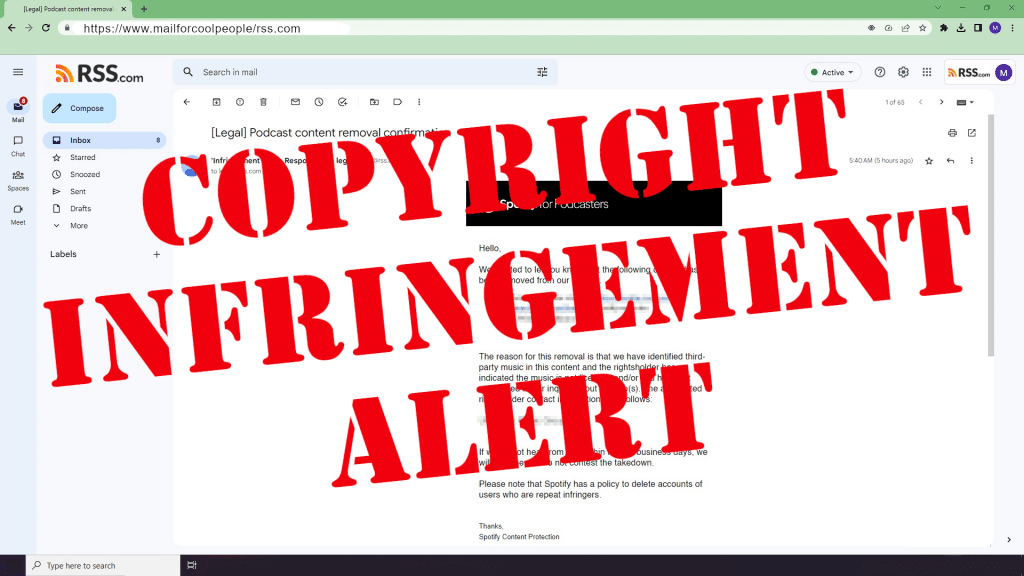
Online Resources for “free” music
If you don’t have access to music from local artists or friends, podcasters should err on the side of caution and use music for commercial use or in the public domain covered by most copyright policies. We have a post on our blog about the best places to get free music for use in your podcast without any legal problems. Make sure you look at the type of license each song has. Even if the license is free, it may require you to attribute the song to the artist in your show notes.
Challenging an infringement claim
If you choose to challenge an infringement claim, look through the platform enforcing the claim. Most will have a way to challenge any infringement claims built right into their platform or support pages.
If your claim is valid, they may choose to reinstate your podcast or podcast episode. If the claim challenge is unverifiable or lost, follow the instructions each platform provides for next steps:
- Dispute an infringement claim on YouTube
- Dispute an infringement claim on Spotify
- Dispute an infringement claim on Apple Podcasts
Most platforms will contact you and/or your hosting platform with information regarding the copyright infringement claim, and contact information to resolve or dispute the claim.
If you’re still confused about the use of copyrighted content online, you can find more information on copyright.gov or check with your podcast hosting provider.
Also remember that copyright policies change from country to country, so look at your country’s specific laws regarding copyright.

